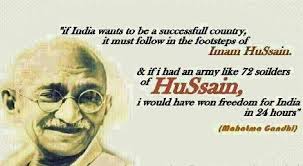Tributes to Mahatma Gandhiji (2nd Oct1869-30th
Jan 1948), or Mohandas Karamchand Gandhi, BAPUJI, Father of the NATION on his
PUNYA THIDHI.
30th January is the date observed at the national
level as Martyrs’ Day. The date was chosen as it marks the assassination of
Mohandas Karamchand Gandhi in 1948.On Martyr’s Day the president, the vice
president, the prime minister, the defence minister, and the three Service
Chiefs gather at the samadhi at Raj Ghat memorial and lay wreaths decorated
with multi-colour flowers. The armed forces personnel blow bugles sounding the
Last Post. The inter-services contingent reverse arms as a mark of respect. A
two-minute silence in memory of Indian martyrs is observed throughout the country
at 11 AM. Participants hold all-religion prayers and sing tributary bhajans.
Early Life and Career: He married Kasturba when he
was only thirteen. He was very truthful from his boyhood days. He went to
England to be a barrister. He did not do well as a lawyer. In South Africa he
began a movement against the British rulers. In India too he led the freedom
movement and at last won independence in 1947.
He formed ‘Mazdur Mahajan Sabha’ for making
movements against the mill owners of Ahmedabad for fixing the working time of
the workers to 8 hours a day. Besides this, the wages were also increased
by 35%, revenue taxes were also decreased in the case of the farmers of Kheda.
For the interest of the indigo farmers in Champaran
they were allotted 3 Kattahs of land each for indigo cultivation. Besides this
the price of the indigo was also raised by 25%.
Gandhiji successfully applied his ideology of
Satyagraha experimentally by giving his leadership in the regional movements.
So, many other important personalities like J.B. Kripalani, Mahadev Desai,
Rajendra Prasad, Vallabhbhai Patel etc. also joined him.
Non-violence and Gandhism: Gandhiji believed in
non-violence and love. He was against untouchability and all sorts of injustice
in society. He lived a saintly life and suffered a lot to see truth triumph.
His heart bled for the poor and the oppressed. He said that all men were equal.
He wanted them all to live in peace. He dreamed of a Ram Rajya in which
everybody would live in peace. He was against the modern civilization. Instead,
he wanted his countrymen to live in the villages.
Freedom Struggle in India: After spending 21 years
in South Africa, Gandhiji returned to India in 1915. While fighting against the
British rule in India, he always maintained his principles of truthfulness,
peace and non-violence. In 1942, he launched the ‘Quit India Movement’ to drive
the British out of the country and gave the famous slogan of ‘do or die’ to his
countrymen. Though, the movement didn’t prove to be an immediate success, the
British had to grant independence to our country in 1947.
Death and Memory: This great son of India was shot
dead on January 30(Martyrs Day), 1948. But he will live forever in our hearts
for what he has done for India.
He influenced Dr. Martin Luther King Jr., Nelson
Mandela, Barrack Obama and millions of other people.
Death and Memory: This great son of India was shot dead on January 30(Martyrs Day), 1948. But he will live forever in our hearts for what he has done for India.
He influenced Dr. Martin Luther King Jr., Nelson Mandela,Narendra Modiji, Barrack Obamaji and millions of other people.




















No comments:
Post a Comment